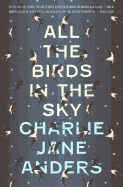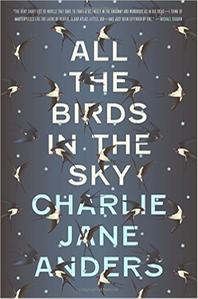
 As editor-in-chief of io9.com, Charlie Jane Anders is one of the most influential voices in the realms of science fiction and fantasy, and her 2012 Hugo-winning story "Six Months, Three Days" further established her considerable bona fides. Her debut novel, All the Birds in the Sky, then, might have suffered under the weight of high expectations if it didn't so easily soar above them.
As editor-in-chief of io9.com, Charlie Jane Anders is one of the most influential voices in the realms of science fiction and fantasy, and her 2012 Hugo-winning story "Six Months, Three Days" further established her considerable bona fides. Her debut novel, All the Birds in the Sky, then, might have suffered under the weight of high expectations if it didn't so easily soar above them.
All the Birds in the Sky is two coming-of-age stories in one, following Patricia Delfine and Laurence Armstead as they evolve from bullied, misunderstood children into socially accepted, internally conflicted adults. Their lives intertwine with each other's and with their respective interests in magic and science. As a child, Patricia finds that she has the ability to talk to animals, and a Parliament of Birds--difficult to explain but exactly what it sounds like--proclaims her a witch. Laurence finds refuge from social torment in gadgetry, building a two-second time machine and an artificial intelligence that talks to Patricia when she's lonely.
Using science fiction and fantasy conceits to tell a coming-of-age story is hardly new: Ender's Game, The Chronicles of Narnia and Lev Grossman's Magicians trilogy have tread similar ground. All the Birds in the Sky stands out thanks to its sweeping ambition. What Anders is attempting here--aside from a bildungsroman, love story, climate change warning, meditation on the nature of consciousness and all-around existentialist panic attack--is nothing short of a grand, semi-literal reconciliation of science with nature.
Still, All the Birds in the Sky is far from a self-serious treatise. Anders embraces nerd-humor with gleeful abandon: "At last he understood what all those old horror stories meant when they talked about an eldritch dread, creeping into your very soul. That was how Laurence felt, listening to his mother attempt to talk to him about girls." Such writing helps to leaven the weighty themes and apocalyptic stakes underpinning the narrative. When Laurence and Patricia find themselves on opposite sides of a brutal conflict between scientists and magicians, those bits of levity become anchors for readers caught in a vicious emotional whirlpool.
In the process of marrying science and nature, Anders also hybridizes rationalism and sentimentality into a new form. This is a novel where a character can make Herzogian pronouncements such as: "Nature has no opinion, no agenda. Nature provides a playing field, a not particularly level one, on which we compete with all creatures great and small" and have it seem no less philosophically significant as another character's experience of first love: "Even as Patricia said it back to him, she felt like her whole history was taking on a whole new focus, the landscape of her past rearranging so that the stuff with Laurence became major geographical features and some other, lonelier, events shrank proportionately." All the Birds in the Sky is a triumph. --Hank Stephenson, bookseller, Flyleaf Books
Shelf Talker: All the Birds in the Sky is an impressive debut that weaves magic and science fiction into an emotionally complex story about growing up and finding love.

